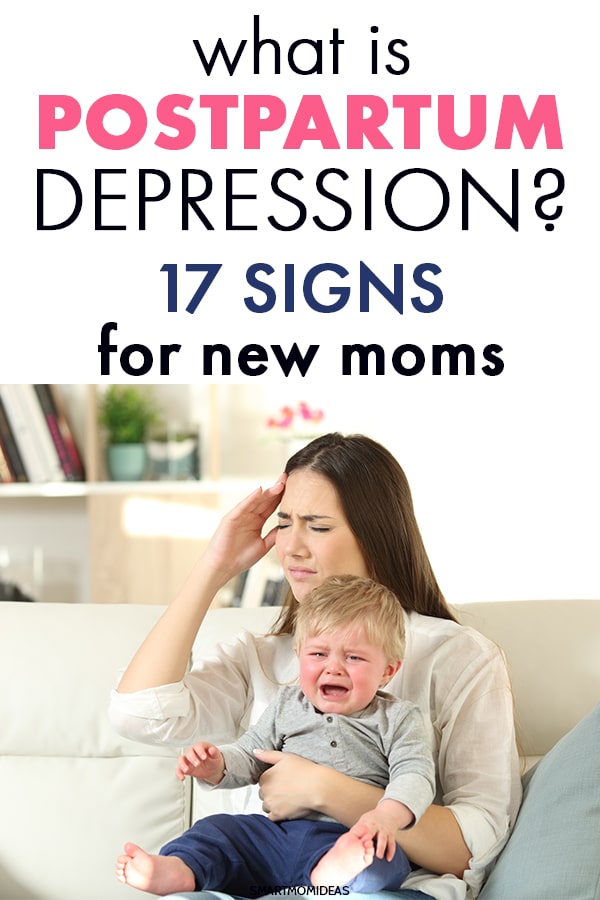Learn the most common and subtle signs of postpartum depression and what you can do to treat it!

The early stages of motherhood are filled with so much joy and love. But what do you do when your sadness outweighs your joy? You know you want to be happier, but you can’t seem to even fake it. Ever been there?
Postpartum depression is a painful and destructive tornado in any mother’s life. As someone who has battled with depression and postpartum depression, it’s a real thing and can affect your entire family – not just you.
But thankfully, it’s not something you have to tolerate in your life any longer, mama.
I want to share 17 signs of postpartum depression and what you can do to treat and ease your depression.
Why tolerate motherhood, when you can thoroughly enjoy it, mama?!
Understanding Postpartum Depression

What Is Postpartum Depression?
Postpartum depression (also known as PPD) is when a mother suffers from depression after childbirth. The depression period can start at anytime after the child is born and last until baby’s first year of life.
It’s important to note that the signs of postpartum depression is not the baby blues (lasting 2 weeks or less). Baby blues are extremely common and experienced by 50% of new mothers.
Roughly 10-15% of postpartum mothers face a more severe form of depression, which we’ll be talking about in this article.
What Causes Postpartum Depression?
Causes for postpartum depression differ and vary depending on each person. Here are some common causes:
- Financial hardships
- Trying to live up to unrealistic standards as a new mother
- Lack of a strong support system
- Hormone changes after childbirth
- The strain of meeting your child’s needs and properly being able to care for them
- Big changes such as adjusting to a new job, death of a loved one, or a change in relationships
- Inability to have enough time for yourself
Symptoms
Postpartum depression has many signs that indicate you may have more than just baby blues. These are the most common signs found in mothers with PDD. But remember that you may still have PPD even if you are not experiencing all of these symptoms.
One mother may experience a couple of these symptoms more intensely, while another mother may experience a mild case of them all.
1. Crying
You may not even now the reason. Do you find yourself overwhelmed and wanting to lock yourself in the closet just to cry? You may feel the urge to cry or weep unexpectedly for reasons you might not know.
2. Irritability
We all tend to get a little short tempered from time to time. But do you find yourself that way more often with little to no provoking? Using a mean tone of voice with your husband or being grumpy more frequently can be evidence that something isn’t right.
3. Feeling Hopeless
Like depression, PPD has a way of keeping you blind and hopeless. Thoughts like, “Things will never get any better” or “I’ll never be able to be the person I really want to be since motherhood is so demanding” are thoughts that keep you bound up in fear and hopelessness.
The intense demands of motherhood can be more draining emotionally on women with PPD. So much so that they cease to have enthusiasm about their future. It can seem dark and unfulfilling.
4. Anger
Anger is one of those lesser known symptoms. It falls out of the bracket of PPD signs we think to examine first.
Being angry at yourself or your baby is a huge cause for concern. When overwhelmed by this emotion, it can feel embarrassing to discuss it with a doctor. Especially if they don’t ask. But I urge you to take it very seriously.
Failing to address the issue only intensifies your depression going forward.
5. Fear
Fear is a joy and peace killer. It’s like being locked up in a prison cell. It’s so bad that it’s gripping thoughts can paralyze you and suck the life out of you!
We all undeniably have some level of fear. But postpartum depression can heighten those fears or bring about new ones. Can you relate to any of these common (but hidden) fears mothers around the world are facing?
- Fear of not being good enough
- Fear you’ll hurt yourself or your baby
- Fear your child will hate you for your shortcomings when they get older
- Fear you don’t have what it takes to be a great mother
- Fear you’ll never be truly happy again
6. Lack of Concentration
Between sleep deprivation and striving to meet your baby’s demands each day, it can feel like you’re hanging on by a hair! And hopefully you haven’t started pulling your hair out!
It can be hard to concentrate on any one task (no matter how important). You may feel robotic in your day to day life. You may feel unorganized, disoriented, and unable to even enjoy the simple things in life again.
7. Restlessness
Anxiety and restlessness go hand in hand. Are you unable to focus at work because you’re consumed with all the thoughts about what you need to do when you get home?
What about when you eat? Are your thoughts running wild about how you’ll plan time for hubby, care for baby, get ahead on prepping the next meal, and squeeze in time to brush your teeth?
Is your mind always on go-mode without ever feeling the freedom or ease to just enjoy each moment?
8. Insomnia
If sleep deprivation (due to your baby’s needs) wasn’t already enough, insomnia weights down extremely heavy. It’s a huge red flag for mothers with PPD.
If you have difficulty falling asleep or staying asleep (especially when you’re able to), talk to your doctor, mama. The inability to get the quality rest you need can lead to many other problems.
9. Guilt
The tough thing about PPD is that so many of the symptoms are going on in a mother’s head as she suffers in silence. You can feel anger, sadness, disorganized, and have the most insane mood swings.
And at the end of the day,the guilt for those feeling or behaviors can eat away at you!
“I should be able to be happier” or “I’m a horrible mother because I yelled at my baby” only make the depression worse. Yet, so many moms struggle with this type of guilt.
10. Sadness
Because many don’t understand how a mother can be so sad after childbirth, it’s a closed topic among friends, family, and (for the most part) in society.
Sadness is one of the most obvious signs of PPD. But a lot of time the mother will have a hard time pointing out the reason for her extreme sadness.
11. Withdrawn
Mothers with postpartum depression may decide to discontinue their hobbies and even draw back from the social relationships they once had. This could be either because they no longer have the desire to pursue them or because the effort to carry on is just too strenuous.
12. Mood Swings
Caring for a little one is no easy task. Especially if you have more than one! As your hormones change, it can feel as if you’re taking an involuntary ride on a sickening (not fun!) roller coaster.
One moment you can feel so happy, like anything is possible. And the next, you’re anything from discouraged, dreading taking care of your baby, sad, and wanting to crawl back in to bed for the rest of the day.
13. Panic Attacks
Panic attacks can make you feel as if you’re suffocating under pressure. The onset of a panic attack comes without warning.
Some of the most common symptoms include:
- Racing heart
- Feeling faint or dizzy
- Sweating or having chills
- Difficulty breathing
- Chest pains
- Tingling and numbness in hands or fingers
- Feeling like you’re losing control
- Feeling terror (sometimes paralyzing)
14. Change in Appetite
This can go one of two ways. You may experience the urge to eat compulsively (perhaps to take your mind off of stress or for comfort) or you may lose the interest to eat at all.
While you may not go as far as to become anorexic, keep in mind that an absent desire or willingness to nourish your body with good food should be closely examined, mama.
15. Anxiety
Anxiety usually affects women during their pregnancy and into their baby’s first year of life.
About half of women who have signs of postpartum depression also suffer from postpartum anxiety.
Constant tormenting fearful thoughts can consume you.
Anxiety and extreme nervousness can span from worrying you’ll drop or hurt your baby all the way to the unthinkable. “What if I do something wrong and I accidentally kill my baby?”
16. Loss of Interest
Another sign of postpartum depression is the sudden (or gradual) decline of wanting to participate in your daily responsibilities or the things that once made you happy.
This could include:
- Eating
- Sex
- Going to work
- Taking care of your baby and/or other your children
- Pursuing hobbies
- Caring for yourself
- Tending to homemaking responsibilities
17. Destructive Thoughts
Postpartum depression is a monster! And this is where it really gets ugly. Among the worst cases are mothers who have thoughts of hurting themselves, their baby, or others.
This may also include thoughts of committing suicide or killing another person (especially baby).
While the symptoms I’ve mentioned this far are all important to examine, if you’re having destructive thoughts like these, I urge you to talk to your doctor immediately.
Some cases may require that you leave your baby with a trusted individual (like a family member) to be cared for while you seek help.
These thoughts should never be ignored. Calling a suicide hotline will allow you to speak with someone who will listen and help you get more of the help you need.
You might also want to consider a crisis nursery if you have one locally. This would allow you to have some time alone while your child is looked after by child care staff.
Treatment Options for Postpartum Depression

Self Care
1. Get Adequate Amounts of Sleep
Good sleep paired with good nutrition and exercise (unless advised otherwise by your doctor) is a minimum to keep you thriving as a postpartum mother.
I know sleep is not easy to come by, but you need to make it a priority. Mothers are always the first to take the blow to their sleep schedule after baby is born.
It’s recommended that you get between 7 and 9 hours of sleep per night.
If you’re struggling to get enough sleep, be sure to reach out to those who may be able to offer you some support (for instance, your mom or hubby). Even if it’s just to get you through for a couple of months.
2. Eat Healthy Meals (Often Enough)
You may have heard the comparison before between a car and the human body. It’s a great way for us to understand just how everything functions cohesively and is connected in one way or the other.
Think of your body like a car. It may look real nice externally, been washed, waxed, and have all the parts working well. None of those things matter most if you’ve put no gas in the car to be able to drive it!
Your body functions in a similar way. All except if you don’t put the right foods in, you’ll still be able to live (just not at your optimal potential!).
Our bodies were created to run on food as our fuel. But not just any food. Healthy, nutrient-rich, life-giving foods!
You not only are what you eat, but you feel what you eat. Studies have shown that certain foods are linked to higher levels of depression.
Truthfully, maintaining a consistent healthy diet isn’t easy! But if you’re absolutely serious about digging to the root of your depression, this is a great place to start.
After consulting your doctor, try eliminating certain foods from your diet and replace them with healthier options.
3. Drink Enough Fluids
When do you grab for your daily glasses of water mama? Is it only when you feel thirsty?
Yes? Ahhh, that’s a problem! More often than not, by the time our bodies cry out for water, it’s during the initial stages of dehydration.
Although there are a few factors to consider regarding water intake, it’s best to stick to the 8 glasses per day range.
4. Factor in Time for You
It’s okay to be clear on what your needs are and to fulfill them so that you can be able to care for your baby. Don’t try to maintain a supermom image!
Mothers feel like they should be always doing more. But allow yourself the time to rest. It doesn’t mean you’re lazy!
Make self care a priority. Read the book you want, explore the library, or eat your lunch outside while you soak up the sun. And did I mention taking the extra time to do your hair again? Put on the sexy dress you have hiding in the back of your closet (not the tank and sweatpants!).
Don’t have one? Go buy one! 🙂 Don’t put off loving yourself any longer, mama.
5. Exercise
Exercise and movement is one of the best things you can do for your body! Especially the routines where you work up a good sweat. 🙂
The health advantages are absolutely phenomenal!
Exercising is known to decrease (and in some cases eliminate!) anxiety and depression! Even mild exercising 2-3 times per week can positively affect your mental health.
If you’re feeling overwhelmed about starting an exercise plan, just begin by walking. Set a goal for the number of steps you want to take each day or week. Once you master that for a couple of weeks, increase the number of steps you take.
Tracking your exercise reps will make you feel more accomplished and able to see your overall progress.
Note: It’s best to talk with your doctor first before engaging in an exercise routine. Some exercise routines may be harmful, cause injury, or even slow down your healing process during your postpartum recovery.
6. Create a Support System
So often us mamas try to hold it all together without anyone picking up on the fact that we ourselves are falling apart.
A strong network of support is vital to your health, mama. Every mother should have a strong, encouraging support system. But sadly, not all do. Sometimes a spouse, family, or friends may be supportive verbally, but not physically. Or vice versa.
In either case, if you don’t have the support you want and need, you have to go out and create it.
Identify what your needs are before reaching out to find out how others can help you. For example, are you looking for encouragement in your struggle, transportation support, help around the house, financial support in hard times, a babysitter, or just a listening ear (not everyone is willing to just listen!)?
Family, friends, doctor, postpartum support group, or your church are all great support avenues.
7. Practice Deep Breathing Exercises
Who would have thought. We grow from children into mature, responsible adults that practically forget how to breathe properly.
None of us can do enough preparing for motherhood. When it comes, you just have to learn during each new season of you and baby’s life. Motherhood can become so demanding that we become obsessed with holding up the supermom image. It can actually be so stressful that we forget to breath. Not kidding!
Don’t believe me? The next time your stress level is high, stop and examine how you’re taking in each breath, mama.
Proper breathing has so many benefits to your mental and physical health. It will help deliver oxygen throughout your body as well as reduce your stress levels while improving your mood and feelings!
8. Don’t Isolate Yourself
Depression has a way of making it feel as though your world is caving in on you, and leaving you feeling hopeless and like your life is out of control.
The one thing you don’t want to do though, is seclude yourself, because that’s usually when things get worse. Try to carry on with your normal activities as long as they are not too stressful or contributing to the cause of your depression.
9. Get Your Sunshine
Yes, mama. Don’t doubt it. Sunshine makes you happy! Vitamin D brings out positivity.
It’s hard to be outside on a beautiful day and not be happy (or happier) than when you feel low and depressed.
Studies show that people who are vitamin D deficiency are more likely to be depressed.
If you can’t make it out in the sun much, consider taking a vitamin D supplement. Either way, this is a really simple treatment option.
10. Eliminate Possible Culprits
Let’s just be honest here, okay?What three foods can you name that you reach for when you’re feeling depressed?
My guess is that they all are either loaded with sugar or they are something that comes out of a box or bag.
Since certain foods are linked to higher levels of depression, I would start by examining what you’re eating. Junk foods, caffeine, dairy, and refined sugars are known to cause depression.
While they may not be causing it, they’re probably not helping you to overcome. It’s a hard fact, but true. The addictive foods we love to eat the most when depressed or stressed are the foods that are actually attacking us on a mental and physical level.
You should be eating to fight your depression and not feed it.
11. Dig to the Root
Think about what’s really bothering you.
Train your mind to think what you want it to. Not because you feel a certain way or your circumstances are the best. Your mind is your daily homework. Choose to overcome false thoughts that keep your PPD close.
Are you feeling inadequate as a mother? Overwhelmed with the challenges of motherhood? Are you physically exhausted and need to rest more but can’t?
What are your beliefs around what’s really bothering you? How can you work through those thoughts. Think about how you can begin to form new beliefs and thoughts that support truth, and not just the way you feel at any particular moment, mama?
Therapy
Therapy has acquired sort of a bad name when it comes to depression. It sounds a bit better when someone’s in physical therapy to heal a physical injury. But for depression? Not so much.
I beg to differ. Here are two great therapy options that may get you on a better mental path.
12. Therapist
Talk to a mental health professional about the way you feel. They can help you identify challenges and help you find solutions, set goals, and hold you accountable.
Talking to a therapist is a good option if you feel your life is out of control or want help pinointing some of the root causes.
13. Aromatherapy
Aromatherapy is an excellent way to help you relax, sleep better, and reduce your stress. People have been using essential oils to heal for so many years.
Find out what natural essential oils will ease your stress and anxiety and improve your depression.
Lavender oil is one of the most common essential oils you might consider using to alleviate your depression. It also is known to help with insomnia.
There is Hope for You!
There you are, mama! 17 signs of postpartum depression as well as how you can treat your depression. I know that depression can feel like a never-ending maze.
But I’m hoping this post encouraged you to seek help and not give in to believing there is no hope.
Motherhood comes with many emotional ups and downs and it’s never easy to just keep going. But I’m rooting for you and want you to remember that you’re not a bad mother for struggling with depression. It can happen to any mother.
Give a good attempt to try the tips I’ve listed above and I believe you’ll feel some relief. If you don’t feel better, reach out to your doctor. You matter, mama. Don’t give up!
Let me know which of these tips work best for you. Also feel free to share any tips I haven’t mentioned in the comments.
Don’t forget to pin me!





Leave a Reply